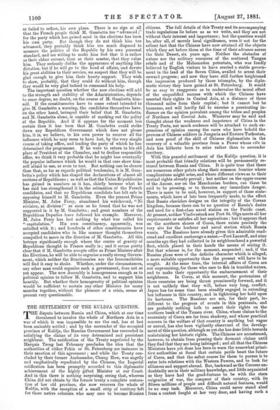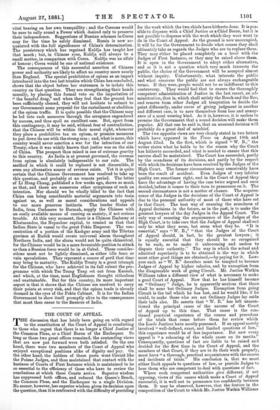THE SETTLEMENT OF THE KULDJA QUESTION.
THE dispute between Russia and China, which at one time threatened to involve the whole of Northern Asia in a war of which it was impossible to see the end, has at last been amicably settled ; and by the surrender of the occupied province of Kuldja, the Russian Government has succeeded in satisfying the claims of its very determined and persistent neighbour. The ratification of the Treaty negotiated by the Marquis Tseng last February precludes the idea that the authorities of either Pekin or St. Petersburg are insincere in their sanction of this agreement ; and while the Treaty con- cluded by their former Ambassador, Chung How, was angrily and emphatically repudiated by the Chinese, the Imperial ratification has been promptly accorded to this diplomatic achievement of the highly gifted Minister at our Court. And in this there is nothing surprising, seeing that, whereas China did not obtain by the former treaty a complete restora- tion of her old province, she now recovers the whole of Kuldja, with the exception of a small strip of territory 'left for those native colonists who may care to become Russian
citizens. The full details of this Treaty and its accompanying trade regulations lie before us as we write, and they are not without their interest and importance ; but the question would be, after all, of merely local significance, were it not for the salient fact that the Chinese have now attained all the objects which they set before them at the time of their advance across the Gobi Desert, six years ago. Neither the obstacles of nature nor the military resources of the scattered Tungan rebels and of the Mahomedan potentate, who was fondly believed by English visitors to have erected a stable govern- ment in the land of the Seven Cities, availed to arrest their onward progress ; and now they have still further heightened the impression produced by those triumphs, by the diplo- matic victory they have gained at St. Petersburg. It would be as easy to exaggerate as to undervalue the moral effect of the unqualified success with which the Chinese have asserted their rights in Central Asia, at a distance of three thousand miles from their capital ; but it cannot but be immense, and will hardly fail to exercise a penetrating in- fluence on the opinion prevalent among the tribes and peoples of Northern and Central Asia. Whatever may be said and thought about the weakness and impotence of China in the Treaty Ports, not much credence will be attached to such ex- pressions of opinion among the races who have beheld the prowess of Chinese soldiers In Jungaria and Eastern Turkestan, and seen proof of the skill of Chinese diplomatists in the recovery of a valuable province from a Power whose role in Asia has hitherto been to seize rather than to surrender territory. With this peaceful settlement of the Kuldja question, it is most probable that friendly relations will be permanently re- stored between Russia and China. It is quite true that there are numerous other points along their common frontier where complications might arise, and where different views as to their mutual rights already prevail ; but neither on the upper course of the Amoor, nor on the Manchurian borders, can these be said to be pressing, or to threaten any immediate danger. There is more to be said, however, in support of those state- ments, which have of late been frequently made, to the effect that Russia cherishes designs on the integrity of the Corean kingdom, because there can be no question of Russia's desire and need for a first-class naval station on the Pacific coast. At present, neither Vladivostock nor Port St. Olga meets all her requirements or satisfies all her aspirations ; but it appears that on the northern shores of Corea, there exists precisely the very site for the harbour and naval station which Russia wants. The Russians have already given this admirable road- stead and excellent anchorage a name,—Port Lazareff, and nine months ago they had collected in its neighbourhood a powerful fleet, which placed in their hands the means of seizing it. But that scheme is, for the moment, suspended ; and, if the Russian plans were of the definite character which is alleged, a more suitable opportunity than the present will have to be sought. At the same time, the internal affairs of Corea are not unpromising, for those who care to fish in troubled waters, and to make their opportunity the embarrassment of their neighbours. In Corea, at this moment, the pretensions of three countries are being thrust prominently forward, and it is not unlikely that they will, before very long, conflict. Japan has for some time been steadily engaged in extending her influence in this country, and in tightening her hold upon its harbours. The Russians are not, for their part, in- different to the progress of events in this peninsula, and are probably nothing loth to assert their rights on the southern bank of the Tumen river. China, whose claims to the suzerainty of Corea are far from shadowy, and whose practical concern in the welfare of that country is anything but vague or unreal, has also been vigilantly observant of the develop- ment of this question, although as yet she has done little towards maintaining her historic rights. The Chinese are accustomed, however, to abstain from pressing their dormant claims until they fiad that they are being infringed ; and all that the Chinese Ministers have yet done has been to warn the somewhat primi- tive authorities at Seoul that certain perils beset the future of Corea, and that the safest course for them to pursue is to enter into relations with the Western Powers, and to look for alliances and support abroad. But, backward as the Coreans un- doubtedly are in their military knowledge, and little acquainted as they have had the good-fortune to be with the stern exigencies of war, the conquest of their country, with its fifteen millions of people and difficult natural features, would be no easy task. Moreover, China could never stand aloof from a contest fought at her very door, and having such a
vital bearing on her own tranquillity ; and the Coreans would be sure to rally round a Power which desired only to preserve their independence. Suggestions of Russian schemes in Corea may for the time be safely dismissed. Russia is now ac- quainted with the full significance of China's determination. The persistency which has regained Kuldja has taught her that much ; but, in Chinese eyes, Kuldja will always be a small matter, in comparison with dorea. Kuldja was an affair of honour ; dorea would be one of national existence.
The consequences of this successful assertion of Chinese power and authority are likely to affect no country more nearly than England. The special prohibition of opium as an import introduced into the two last treaties which China has concluded, shows that the object before her statesmen is to isolate this country on that question. They are strengthening their hands morally, by placing this formal veto on the importation of " the baneful drug," and when they feel that the ground has been sufficiently cleared, they will not hesitate to submit to our Government some proposal for the curtailment or abolition of the opium traffic. It is quite possible that the Chinese may be led into rash measures through the arrogance engendered by success, and thus spoil an excellent case. But, apart from this contingency, it may be said, without fear of contradiction, that the Chinese will be within their moral right, whenever they place a prohibitive tax on opium, or promise measures to put down its use with the strong arm ; and, what is more, this country would never sanction a war for the infraction of our Treaty, when it was widely known that justice was on the side of China. The prospect thus raised is one of extreme gravity to this country. As India is at present governed, the revenue from opium is absolutely indispensable to our rule. The method in which it could be replaced is not discernible, if even any alternative source of revenue exists. Yet it is quite certain that the Chinese Government has resolved to take up this question, and probably at no remote period. The letter of Li Hung Chang, published a few weeks ago, shows as much as that, and there are numerous other symptoms of such an intention. Nor should we be wholly blind to the fact that China can bring considerable material arguments into train against us, as well as moral considerations and appeals to our more generous instincts. The border States of India, from Cashmere to Burmah, supply the Chinese with an easily available means of causing us anxiety, if not serious trouble. At this very moment, there is a Chinese Embassy at Khatmandoo, the Nepaulese capital, to remind us that that Indian State is vassal to the great Pekin Emperor. The con- centration of a portion of the Kashgar army and the Tibetan garrison at Rudok would create universal alarm throughout Northern India, and the alarm would not be quite chimerical, for the Chinese would be in a more favourable position to attack us than a Russian force would be in at Cabul. These consider- ations must not be lightly dismissed, as either idle fears or vain speculations. They represent a source of peril that time may bring to maturity. The Kuldja Treaty is a great triumph for the Chinese, who have achieved in its full extent the pro- gramme with which Tso Tsung Tang set out from Kansuh, and which, at the time, most Englishmen thought ridiculous and unattainable. But for this country, its more important aspect is that it shows that the Chinese are resolved to carry their points at every risk, and that the opium trade is already doomed in the eyes of the Pekin Cabinet. It is for the Indian Government to show itself promptly alive to the consequences that must then ensue to the finances of India.































 Previous page
Previous page